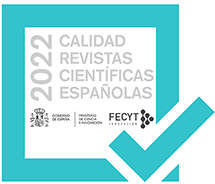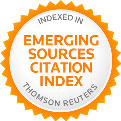Predictores socio-contextuales y motivacionales de la intención de continuar participando: Un análisis desde la SDT en danza. (Social-contextual and motivational predictors of intentions to continue participation: A test of SDT in dance).
Resumen
En el marco de la Teoría de la Autodeterminación (Deci y Ryan, 1985; 2000), se estudiaron los predictores socio-contextuales y motivacionales de la intención de seguir practicando danza, y el papel del burnout en estas relaciones, poniendo a prueba dos modelos de ecuaciones estructurales. Los participantes, 197 bailarines vocacionales, completaron los cuestionarios con las variables clave de interés. Los resultados revelaron que las percepciones del apoyo a la autonomía ofrecidas por el profesor de danza actuó como predictor positivo de la motivación autónoma (motivación intrínseca, regulación integrada y regulación identificada) y como predictor negativo de la motivación controlada (regulación externa y regulación introyectada) y de la no motivación. A su vez, la intención de seguir participando en danza fue predicha positivamente por la motivación autónoma y negativamente por la motivación controlada y por la no motivación. En el segundo modelo, la incorporación del burnout como antecedente inmediato de la intención, aumentó la varianza explicada de la intención de continuar participando. La motivación autónoma actuó como predictor negativo del burnout mientras que la motivación controlada y la no motivación presentaron asociaciones positivas con éste. A su vez el burnout se mostró como predictor negativo de la intención de continuar en danza. Los resultados ofrecen apoyo a la teoría de la autodeterminación y destacan los beneficios de promover la motivación autónoma a través de interacciones de apoyo a la autonomía, en un contexto tan complejo como la danza, en el que se valoran tanto los aspectos técnicos como los artísticos.
Palabras clave: Autodeterminación; motivación; danza; burnout; intenciones.
Abstract
Grounded in the framework of self-determination theory (Deci y Ryan, 1985; 2000), socio-contextual and motivational predictors of intentions to continue participation in dance, and the role of burnout in these relationships were studied through the testing of two structural equations models, 197 vocational dancers, completed questionnaires assessing the key variables of interest. Results revealed that perceptions of autonomy support, offered by the dance professor, positively predicted dancers’ autonomous motivation (intrinsic motivation, integrated regulation, and identify regulation) and were negatively linked to controlled motivation (external and introjected regulation) and amotivation. In turn, intentions to continue participation in dance was predicted positively by autonomous motivation and negatively by controlled motivation as well as amotivation. In the second model, the incorporation of burnout as a proximal antecedent of intention increased the explained variance accounted for intentions to continue. Autonomous motivation negatively and controlled motivation and amotivation positively predicted burnout while a negative path from burnout to intentions to continue participation in dance emerged. Results support self-determination theory and highlight the benefits of promoting autonomous motivation through autonomy-supportive interactions in a context such as dance, where performance and artistry are valued.
Key words: Self-determination, motivation, dance, burnout, intentions
doi:10.5232/ricyde2011.02505
------------------------------------------------------------------------
Referencias/references
Bartholomew, K.J.; Ntoumanis, N.; Ryan, R.M., & Thøgersen-Ntoumani, C. (2011). Psychological Need Thwarting in the Sport Context: Assessing the Darker Side of Athletic Experience. Journal of Sport & Exercise Psychology, 33, 75-102.PMid:21451172
Cresswell, S. L., & Eklund, R. C. (2005a). Changes in athlete burnout and motivation over a 12-week league tournament. Medicine & Science in Sports & Exercise, 37, 1957-1966.
doi:10.1249/01.mss.0000176304.14675.32
Cresswell, S. L., & Eklund, R. C. (2005b). Motivation and burnout among top amateur rugby players. Medicine & Science in Sports & Exercise, 37, 469-477.
doi:10.1249/01.MSS.0000155398.71387.C2
Deci, E. L., & Ryan, R. M. (1987). The support of autonomy and the control of behavior. Journal of Personality and Social Psychology, 53, 1024–1037.
doi:10.1037/0022-3514.53.6.1024
PMid:3320334
Deci, E. L., & Ryan, R. M. (2000). The "what" and "why" of goal pursuits: Human needs and the self-determination of behaviour. Psychological Inquiry, 11, 227-268.
doi:10.1207/S15327965PLI1104_01
Deci, E. L., & Ryan, R. M. (2008). Facilitating optimal motivation and psychological well-being across life’s domains. Canadian Psychology, 49, 14-23.
doi:10.1037/0708-5591.49.1.14
Heider, F. (1958). The psychology of interpersonal relations. New York: Wiley
doi:10.1037/10628-000
Lemyre, P. N.; Roberts, G. C., & Stray-Gundersen, J. (2007). Motivation, overtraining, and burnout: can self-determined motivation predict overtraining and burnout in elite athletes?. European Journal of Sport Science, 7, 115-126.
doi:10.1080/17461390701302607
Little, T.D.; Cunningham, W.A.; Shahar, G., & Widaman, K.F. (2002). To parcel or not to parcel: Exploring the question, weighing the merits. Structural Equation Modeling, 9, 151–173.
doi:10.1207/S15328007SEM0902_1
Lonsdale, C.; Hodge, K., & Rose, E.A. (2008). The development of the Behavioral Regulation in Sport Questionnaire (BRSQ): Instrument development and initial validity evidence. Journal of Sport & Exercise Psychology, 30, 323–355.
PMid:18648109
Mageau, G. A., & Vallerand, R. J. (2003). The coach-athlete relationship: A motivational model. Journal of Sports Sciences, 21, 883–904.
doi:10.1080/0264041031000140374
PMid:14626368
Ntoumanis, N. (2001). A self-determination approach to the understanding of motivation in physical education. British Journal of Educational Psychology, 71, 225-242.
doi:10.1348/000709901158497
PMid:11449934
Pelletier, L. G.; Fortier, M. S.; Vallerand, R. J., & Brière, N. M. (2001). Associations Among Perceived Autonomy Support, Forms of Self-Regulation, and Persistence: A Prospective Study. Motivation and Emotion, 25, 279-306.
doi:10.1023/A:1014805132406
Quested, E., & Duda, J. L. (2010). Exploring the social-environmental determinants of well- and ill-being in dancers: a test of basic needs theory. Journal of Sport & Exercise Psychology, 32, 39-60.
PMid:20167951
Quested, E., & Duda, J. L. (2011). Antecedents of burnout among elite dancers: A longitudinal test of basic needs theory. Psychology of Sport & Exercise 12, 159-167
doi:10.1016/j.psychsport.2010.09.003
Reeve, J. (2009). Why teachers adopt a controlling motivating style toward students and how they can become more autonomy supportive. Educational Psychologist, 44, 159–175.
doi:10.1080/00461520903028990
Ryan, R. M., & Deci, E. L. (2000a). Self-determination theory and the facilitation of intrinsic motivation, social develop¬ment, and well-being. American Psychologist, 55, 68-78.
doi:10.1037/0003-066X.55.1.68
PMid:11392867
Ryan, R.M., & Deci, E.L. (2000b). The darker and brighter sides of human existence: basic psychological needs as a unifying concept. Psychological Inquiry, 11(4), 319-338.
doi:10.1207/S15327965PLI1104_03
Sheldon, K. M., & Watson, A. (2011). Coach’s autonomy support is especially important for varsity compared to club and recreational athletes. International Journal of Sport Sciences & Coaching, 6, 109-123.
doi:10.1260/1747-9541.6.1.109
Standage, M.; Duda, J.L., & Ntoumanis, N. (2003). A model of contextual motivation in physical education: Using constructs and tenets from self-determination and goal perspective theories to predict leisure-time exercise intentions. Journal of Educational Psychology, 95, 97-110.
doi:10.1037/0022-0663.95.1.97
Palabras clave/key words
Texto completo/Full Text:
PDF------------------------ 0 -------------------------
RICYDE. Revista Internacional de Ciencias del Deporte
![]()

Publisher: Ramón Cantó Alcaraz
ISSN:1885-3137 - Periodicidad Trimestral / Quarterly

